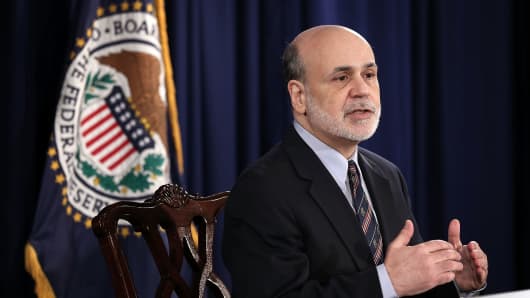Federal Reserve Chairman Ben Bernanke on Monday defended the central bank's aggressive easing of monetary policy, saying while it was aimed at bolstering the U.S. economic recovery, it was helping other countries as well.
The Fed's asset-purchase programs, aimed at keeping long-term borrowing costs down and spurring investment, have been criticized overseas for their adverse impact on emerging market currencies.
But the Fed chief, fresh from a grilling from Congress on the potential domestic risks of his quantitative easing measures, countered the rhetoric about "currency wars," though he did not use the term specifically.
In prepared remarks to a group of academics in London, Bernanke said the integrated nature of the global economy meant the whole world benefits from a sturdier U.S. outlook.
"Because stronger growth in each economy confers beneficial spillovers to trading partners, these policies are not 'beggar-thy-neighbor' but rather are positive-sum, 'enrich-thy-neighbor'actions," he said.
In response to a deep financial crisis and recession, and subsequent weak recovery, the Fed not only lowered overnight interest rates to effectively zero but bought more than $2.5 trillion in mortgage and Treasury securities.
Domestic critics say the central bank's vastly expanded balance sheet, now topping $3.1 trillion, risks future inflation. But Bernanke has noted that inflation is forecast to remain at or below the central bank's 2 percent target for the foreseeable future.
Economic growth, meanwhile, remains more of a question mark, particularly with the combination of sharp spending cuts at home and turbulence in European financial markets casting a pall over some better recent U.S. economic data.
Analysts expect U.S. gross domestic product will expand around 2 percent this year, while Fed officials see 2013 growth between 2.3 percent and 2.7 percent.
"The distinction between monetary policies aimed at domestic objectives and trade-diverting exchange rate devaluations and other protectionist measures is critical," Bernanke said.
Last week, the central bank reiterated its commitment to $85 billion's worth of monthly purchases of mortgage backed securities and Treasurys, though investors are questioning when the Fed will begin to wind down its quantitative easing program.
The Fed has said it will maintain its quantitative easing program until it sees sustainable improvements in the labor market and stronger economic growth in the U.S.
Specifically, it has said it won't consider ending its program or raising interest rates until the unemployment rate falls below 6.5 percent, currently at 7.7 percent, and inflation tops 2.5 percent — at 2 percent in February,according to the Bureau of Labor Statistics.


